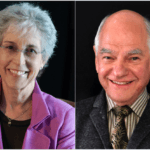
#43 – Alan Bauman, M.D.: The science of male and female hair restoration – how to protect, enhance, and restore the appearance and health of the hair and scalp
“When [a patient] looks in the mirror and sees that hairline growing back in and says, ‘I would never have thought I would see my hairline again. I never thought I’d cover that bald spot.’ I mean, that’s the exciting thing that keeps me going every day.” —Alan Bauman

#42 – Avrum Bluming, M.D. and Carol Tavris, Ph.D.: Controversial topic affecting all women—the role of hormone replacement therapy through menopause and beyond—the compelling case for long-term HRT and dispelling the myth that it causes breast cancer
“We welcome the criticism and the discussion, that way we will all learn. We don’t claim to have the final answer, but we think that this book [Estrogen Matters] represents an important step forward in empowering women and helping them live longer and live better.” —Avrum Bluming

#36 – Eric Chehab, M.D.: Extending healthspan and preserving quality of life
“Aging is such a big part of what we treat in orthopedics. . .our role is to help patients adapt and cope with their new reality. . .[without] imposing any artificial limits on them.” —Eric Chehab

#26 – AMA #3: supplements, women’s health, patient care, and more
“In case you haven’t guessed yet, there’s been a lot of drug traffic on the beach. And I’m not talking about Robitussin and No-Doze. I’m talking about the hard stuff, and a lot of it. I’ve been trying to find out who’s behind it. It hasn’t been easy. I don’t shower much.” —Irwin M. Fletcher

#13 – Brett Kotlus, M.D.: How to look younger while we live longer
“Using these powerful basics, I’ve seen amazing changes.” —Brett Kotlus, referring to the 3 simple tools people can utilize to protect and rejuvenate their skin

#10 – Matt Kaeberlein, Ph.D.: rapamycin and dogs — man’s best friends? — living longer, healthier lives and turning back the clock on aging and age-related diseases
“I believe that rigorously demonstrating that we can increase healthspan and lifespan in pet dogs will be a huge step toward gaining the support and credibility that the field needs.” —Matt Kaeberlein

MDMA and zero LDL-C
Another interesting read is the “zero LDL-cholesterol hypothesis” paper

